Posted on March 30, 2011 by Eric Blair -

The definitive account of New Labour’s rise and fall. On 11 May 2010 Gordon Brown resigned as Prime Minister; it marked the end of thirteen dramatic years of Labour government. When he finally released his grip on power, many questions remained about the most intriguing and complex political figure of modern times and co-architect of New Labour. Leading commentator Steve Richards watched every step of the stormy political journey from 1992, when Brown became shadow chancellor, to the day he left Number Ten, and narrates it here for the first time. Steve Richards has gained access to all levels of Westminster to explain this complex party and its leadership, reflecting on the outcome of the 2010 general election and what the fall of New Labour means for our nation’s political future.
Posted on March 30, 2011 by The Orwell Prize -
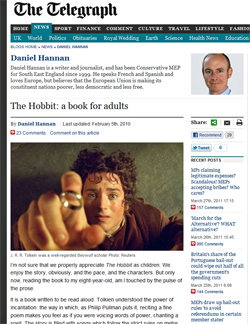
Daniel Hannan is a writer and journalist, and has been Conservative MEP for South East England since 1999. He speaks French and Spanish and loves Europe, but believes that the European Union is making its constituent nations poorer, less democratic and less free.
Submitted blogposts
Other links
Posted on March 30, 2011 by The Orwell Prize -

The Republic of Ireland, which declared itself in 1949, allowed the Catholic Church to dominate its civil society and education system. Investment by American and European companies, and a welcoming tax regime, created the ‘Celtic Tiger’ of the 1990s. That brief burst of good fortune was destroyed by a corrupt political class which encouraged a wild property boom, leaving the country almost bankrupt. What Ireland needs now is a programme of real change. It needs to become a fully modern republic in fact as well as name. This disastrous economic collapse also allows us to think through the kind of multiculturalism that Ireland needs, and to build institutions that can accommodate the sudden influx of migrants who have come to Ireland in the past 15 years. The State should take over the entire education system, for which it pays already, and make it fit for the 21st century. The political system is dysfunctional and is one of the main causes of the debacle we have just experienced. Ireland needs constitutional reform. Politicians have been let get away with murder, and there is a fatalistic sense that nothing can change. The country needs to encourage participation in, and oversight and knowledge of politics, to make people feel that they have a right to challenge the old party machines and to make a difference. It is their country, after all.
Posted on March 30, 2011 by The Orwell Prize -

I’m Paul Mason, Newsnight’s economics editor, a job that takes me from Kenyan shanty towns to Russian hedge funds and Chinese factories. My blog is called Idle Scrawl. It veers wildly across the subject: from house prices, to global poverty; from deconstructing glib terminology to devastating critiques of the England football management. It is occasionally meant to be funny.
Submitted blogposts
Other links
Posted on March 30, 2011 by Eric Blair -

For many years Sierra Leone and Liberia have been too dangerous to travel through, bedevilled by a uniquely brutal form of violence from which sprang many of Africa’s cruellest contemporary icons – child soldiers, prisoner mutilation, blood diamonds. With their wars officially over, Tim Butcher sets out on a journey across both countries, trekking for 350 miles through remote rainforest and malarial swamps. Just as he followed H M Stanley through the Congo – a journey described in his bestseller Blood River – this time he pursues a trail blazed by Graham Greene in 1935 and immortalised in the travel classic Journey Without Maps. Greene took 26 bearers, a case of scotch, and hammocks in which he and his cousin Barbara were carried. Tim walks every blistering inch to gain an extraordinary ground-level view of a troubled and overlooked region. As a journalist in Africa, Tim came to know both countries well although the wars made trips to the jungle hinterland far too risky. This is where he now heads, exploring how rebel groups thrived in the bush for so long and whether the devil of war has truly been chased away. He encounters other ‘devils’, masked figures guarding the spiritual secrets of jungle communities. Some are no more threatening than schoolmasters but others are much more sinister, relying on ritual cannibalism as a source of their magical power. Tim encounters these devils on an epic journey that demands courage, doggedness and good fortune. Chasing the Devil is a dramatic travel book touching on one of the most fraught parts of the globe at a unique moment in its history. Weaving history and anthropology with personal narrative – as well as new discoveries about Greene – it is as exciting as it is enlightening.
Posted on March 30, 2011 by The Orwell Prize -

Leningrad, 1952. Andrei, a young hospital doctor, and Anna, a nursery school teacher, are forging a life together in the postwar, postsiege wreckage. But their happiness is precarious, like that of millions of Russians who must avoid the claws of Stalin’s merciless Ministry of State Security. So when Andrei is asked to treat the seriously ill child of a senior secret police officer, he and Anna are fearful. Trapped in an impossible, maybe unwinnable game, can they avoid the whispers and watchful eyes of those who will say or do anything to save themselves? The Betrayal is a powerful and touching novel of ordinary people in the grip of a terrible and sinister regime, and a moving portrait of a love that will not be extinguished.
Posted on March 30, 2011 by The Orwell Prize -

To follow.
Posted on March 30, 2011 by The Orwell Prize -
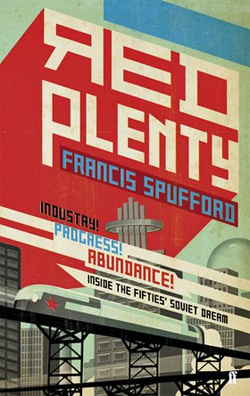
Once upon a time in the Soviet Union… Strange as it may seem, the grey, oppressive USSR was founded on a fairytale. It was built on the 20th-century magic called ‘the planned economy’, which was going to gush forth an abundance of good things that the lands of capitalism could never match. And just for a little while, in the heady years of the late 1950s, the magic seemed to be working. Red Plenty is about that moment in history, and how it came, and how it went away; about the brief era when, under the rash leadership of Nikita Khrushchev, the Soviet Union looked forward to a future of rich communists and envious capitalists, when Moscow would out-glitter Manhattan, and every Lada would be better engineered than a Porsche. It’s about the scientists who did their genuinely brilliant best to make the dream come true, to give the tyranny its happy ending. It’s history, it’s fiction. It’s a comedy of ideas, and a novel about the cost of ideas. By the award-winning (and famously unpredictable) author of The Child That Books Built and Backroom Boys, Red Plenty is as ambitious as Sputnik, as uncompromising as an Aeroflot flight attendant – and as different from what you were expecting as a glass of Soviet champagne.
Posted on March 30, 2011 by The Orwell Prize -

Rory Carroll is south America correspondent for The Guardian. His submitted articles were published by The Guardian and The Observer.
Submitted articles
Other links
Posted on March 30, 2011 by The Orwell Prize -
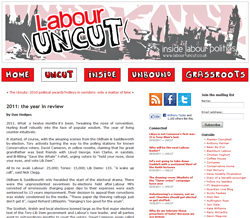
Inside Labour politics. Commissioning Editor of Labour Uncut, and recent addition to the blogging powerhouse of the New Statesman.
Submitted blogposts
Other links
Posted on March 30, 2011 by The Orwell Prize -

The definitive account of New Labour’s rise and fall. On 11 May 2010 Gordon Brown resigned as Prime Minister; it marked the end of thirteen dramatic years of Labour government. When he finally released his grip on power, many questions remained about the most intriguing and complex political figure of modern times and co-architect of New Labour. Leading commentator Steve Richards watched every step of the stormy political journey from 1992, when Brown became shadow chancellor, to the day he left Number Ten, and narrates it here for the first time. Steve Richards has gained access to all levels of Westminster to explain this complex party and its leadership, reflecting on the outcome of the 2010 general election and what the fall of New Labour means for our nation’s political future.
Posted on March 30, 2011 by The Orwell Prize -
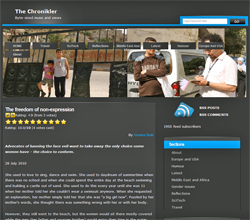
Submitted blogposts published at The Chronikler, Comment is Free, New Statesman and Worldpress. Osama Diab is an Egyptian-British journalist and blogger who lives between his two favourite metropolises: Cairo and London. He writes about the religious, social, political and human right issues of Egypt and the Middle East.
Submitted blogposts
Other links
Posted on March 30, 2011 by The Orwell Prize -

In 23 Things They Don’t Tell You About Capitalism the award-winning Ha-Joon Chang dispels the myths and prejudices that have come to dominate our understanding of how the world works. He succeeds in both setting the historical record straight (‘the washing machine has changed the world more than the internet’; ‘the US does not have the highest living standard in the world’; ‘people in poor countries are more entrepreneurial than people in rich countries’) and persuading us of the consequences of his analysis (‘making rich people richer doesn’t make the rest of us richer’; ‘companies should not be run in the interest of their owners’; ‘financial markets need to become less, not more, efficient’). As Chang shows above all else, all economic choices are political ones, and it is time we started to be honest about them.
Posted on March 30, 2011 by The Orwell Prize -

For much of the world, Iran’s 2009 summer of upheaval was an epic piece of theatre distantly observed. As citizens took to the streets in their millions to protest a stolen election and the regime that made it possible, and later, in smaller numbers, did battle with the shock troops of the Islamic Republic, so the country became effectively off limits for the world’s media. This dramatic confrontation – and the deep divisions that opened among Iran’s rulers as a result – have yet to be convincingly described for a Western audience. Afsaneh Moqadam observed and took part in the momentous events of that summer. Here, through the eyes of Mohsen, one of Tehran’s young, courageous protesters, Moqadam tells the story of these historic months, from the mass marches that greeted the disputed election results to their brutal suppression by the hated Basij militia – and a dark aftermath of imprisonment, torture and a show trial worthy of Stalinist Russia. The result is an inspiring account of a confrontation that has signalled the fragility of the Islamic Republic and given pause to those Western leaders, notably President Barack Obama, who must grapple diplomatically with what may become the world’s next nuclear power. Above all, Death to the Dictator! is testament to the resilience of the human spirit, and its ability to strike fear in the hearts of despots.
Posted on March 30, 2011 by The Orwell Prize -

Gideon Rachman became chief foreign affairs columnist for the Financial Times in July 2006. He joined the FT after a 15-year career at The Economist, which included spells as a foreign correspondent in Brussels, Washington and Bangkok. He also edited The Economist’s business and Asia sections. His particular interests include American foreign policy, the European Union and globalisation. He is the author of Zero-Sum World, published by Atlantic Books in November 2010.
Submitted articles
Other links
Posted on March 30, 2011 by The Orwell Prize -

‘I once believed that we only had to put in place the conditions for equality for the remnants of old-fashioned sexism in our culture to wither away. I am ready to admit that I was wrong.’ Empowerment, liberation, choice. Once the watchwords of feminism, these terms have now been co-opted by a society that sells women an airbrushed, highly sexualised and increasingly narrow vision of femininity. While the opportunities available to women may have expanded, the ambitions of many young girls are in reality limited by a culture that sees women’s sexual allure as their only passport to success. At the same time we are encouraged to believe that the inequality we observe all around us is born of innate biological differences rather than social factors. Drawing on a wealth of research and personal interviews, Natasha Walter, author of the groundbreaking The New Feminism and one of Britain’s most incisive cultural commentators, gives us a straight-talking, passionate and important book that makes us look afresh at women and girls, at sexism and femininity, today.
Posted on March 30, 2011 by The Orwell Prize -
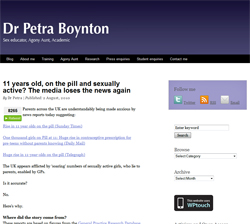
I am a lecturer in International Health Services Research at a London university where I teach doctors, nurses and other health professionals at postgraduate level. I regularly present at conferences in the UK and internationally, and complete research and training within the area of sex and relationships health. I have a BA in Social Psychology (Sussex University), and a PhD is in Applied Human Psychology (Aston University). My PhD focused on the effects of sexually explicit material. I have lectured at a number of UK universities, specialising in evidence based healthcare, and understanding research methodologies (both qualitative and quantitative). My research has covered topics within the area of sexual health, including the effects of pornography, women involved in street prostitution, policy and practice in sex education, evaluating advice giving in the media, sexual functioning, and modernising sexual health services.
Submitted blogposts
Other links
















